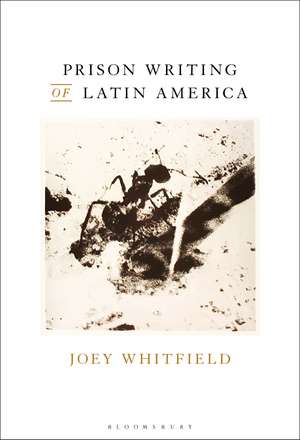Prison Writing of Latin America
Autor Dr Joey Whitfielden Limba Engleză Paperback – 22 ian 2020
| Toate formatele și edițiile | Preț | Express |
|---|---|---|
| Paperback (1) | 223.28 lei 43-57 zile | |
| Bloomsbury Publishing – 22 ian 2020 | 223.28 lei 43-57 zile | |
| Hardback (1) | 655.82 lei 43-57 zile | |
| Bloomsbury Publishing – 25 iul 2018 | 655.82 lei 43-57 zile |
Preț: 223.28 lei
Preț vechi: 288.13 lei
-23% Nou
Puncte Express: 335
Preț estimativ în valută:
42.74€ • 46.44$ • 35.92£
42.74€ • 46.44$ • 35.92£
Carte tipărită la comandă
Livrare economică 21 aprilie-05 mai
Preluare comenzi: 021 569.72.76
Specificații
ISBN-13: 9781501361708
ISBN-10: 1501361708
Pagini: 216
Ilustrații: 2 b/w illustrations
Dimensiuni: 152 x 229 mm
Greutate: 0.3 kg
Editura: Bloomsbury Publishing
Colecția Bloomsbury Academic
Locul publicării:New York, United States
ISBN-10: 1501361708
Pagini: 216
Ilustrații: 2 b/w illustrations
Dimensiuni: 152 x 229 mm
Greutate: 0.3 kg
Editura: Bloomsbury Publishing
Colecția Bloomsbury Academic
Locul publicării:New York, United States
Caracteristici
Brings to light prisoner perspectives on key issues that have faced Latin America over the past century: the changing nature of state power, racial and gender hierarchies, political violence, neoliberalism, and the war on drugs
Notă biografică
Joey Whitfield is Lecturer in Latin American and Hispanic Studies at Cardiff University, UK.
Cuprins
List of IllustrationsAcknowledgmentsNote on TranslationsIntroduction 1. The Punitive and the Lettered City: The Politics of Prison Writing 2. 'We are the men without women': Hegemonic Masculinity and the Hegemony of the Prison 3. Heterotopia, Utopia, Necrotopia: Sovereignty and Struggle in the Peruvian Prison4. Prison Writing and The War on Drugs Beyond the PrisonBibliographyIndex
Recenzii
Whitfield's careful and nuanced readings provide a new standpoint from which to consider broader structures of domination ... The book is a valuable examination of the conditions of social solidarity, and a demonstration of the role that the literary imagination (of both the writer and reader) can play in (re)configuring ethical bonds underpinning a movement towards social justice.
Highly original in terms of its subject matter and displaying evidence of extensive research, Prison Writing of Latin America engages thoughtfully and intelligently with primary and secondary materials in order to develop a substantial contribution to our understanding of prison culture and Latin-American culture. The book offers both a theoretical reflection around notions of penality and a specific study of literary and artistic representations of prison culture in a modern Latin-American context. It is very effective on both levels. It includes a nuanced and highly reflective internal debate about ways of thinking about prison, punishment, resistance and the state. The corpus is varied and helps unfold a broad-ranging and complex set of considerations about state punishment that is sensitive to ambiguity and contradiction while maintaining a kind of committed ethical thrust. An extremely valuable book.
With this poignant book, Whitfield opens the gate to Latin-American prison writers for an English-speaking audience. Their creative writings are a testimony of persistent penal violence that reinforces class, race and gender hierarchies. A book that must be read by anyone concerned with criticism of the Penal State and alternative paths toward social justice in the continent.
Highly original in terms of its subject matter and displaying evidence of extensive research, Prison Writing of Latin America engages thoughtfully and intelligently with primary and secondary materials in order to develop a substantial contribution to our understanding of prison culture and Latin-American culture. The book offers both a theoretical reflection around notions of penality and a specific study of literary and artistic representations of prison culture in a modern Latin-American context. It is very effective on both levels. It includes a nuanced and highly reflective internal debate about ways of thinking about prison, punishment, resistance and the state. The corpus is varied and helps unfold a broad-ranging and complex set of considerations about state punishment that is sensitive to ambiguity and contradiction while maintaining a kind of committed ethical thrust. An extremely valuable book.
With this poignant book, Whitfield opens the gate to Latin-American prison writers for an English-speaking audience. Their creative writings are a testimony of persistent penal violence that reinforces class, race and gender hierarchies. A book that must be read by anyone concerned with criticism of the Penal State and alternative paths toward social justice in the continent.
